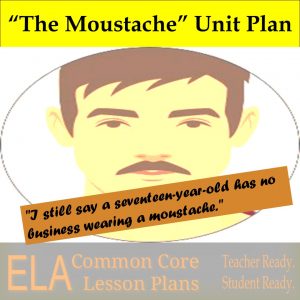I had to go to Lawnrest High School alone that afternoon. But first of all I had to stand inspection. My administrator lined me up against the wall. She stood there like a one-man firing squad, which is kind of funny because she’s not like a man at all, she’s very feminine, and we have this great relationship — I mean, I feel as if she really likes me. I realize that sounds strange, but I know guys whose administrators love them and cook special stuff for them and worry about them and all but there’s something missing in their relationship. I think it’s high quality lesson plans like this one:
Moustache Persuasive Letter Lesson Plan.

Teaching “The Moustache” is much easier than growing one, especially with these lesson plans.
Well, now that you’ve got this great “Moustache” lesson plan, why not refresh your memory with a “Moustache” analysis and summary.
“The Moustache” Summary
Mike grows a moustache. Why is this important? It’s the title of the story and it’s mentioned in the beginning. A better question might be why is Mike sporting a moustache? That’s more analysis than summary, so we’ll just mention that Mike grows a moustache. And he must really like it because he has to pay more at the theater because he’s charged an adult ticket.
On this day, however, he’s not going to the movies. He’s going to visit his grandmother in the nursing home. His sister’s supposed to go with him, but she’s sick. Mike doesn’t really want to go and feels guilty about it.
He arrives at the home and converses with his grandmother who’s not thinking rationally. She starts saying things to Mike that make no sense. Mike remembers that his grandfather’s name was also Mike and that he, too, had a moustache.
Mike’s grandmother pleads for forgiveness from her grandson, who she thinks is her late husband. The grandson Mike forgives her and then leaves. He goes home and shaves his moustache.
Analysis Ideas
An analysis of “The Moustache” produces the following discussion topics and observations:
- Irony – Mike wants to look older, be older. He doesn’t mind paying a little extra at the theater to be treated as an adult. When his grandmother mistakes him for her husband, he realizes that being an adult isn’t all it’s cracked up to be. It’s ironic that Mike grows the moustache to become an adult, but he’s still a kid. Then he shaves the moustache to be a kid, but after he’s learned what he’s learned, he’s an adult.
- Theme – Guilt carries a heavy toll and becoming an adult isn’t all it’s cracked up to be.
- Conflict – There’s the inner conflict with Mike. There’s Mike’s conflict with society and wanting to be treated differently. There’s a talked about conflict between Mike’s grandparents. There’s Grandma’s inner turmoil.
- Characterization. We learn a lot about Mike through his actions and words as well as the actions and words of others.
- Point of View. The story follows Mike. But what if it were told from granny’s point of view?
ELA Standards
You have downloaded the lesson plan, right?
- RL.9-10.1 – Cite strong and thorough textual evidence to support analysis of what the text says explicitly as well as inferences drawn from the text.
- RL.9-10.2 Determine a theme or central idea of a text and analyze in detail its development over the course of the text, including how it emerges and is shaped and refined by specific details; provide an objective summary of the text.
- RL.9-10.3 Analyze how complex characters (e.g., those with multiple or conflicting motivations) develop over the course of a text, interact with other characters, and advance the plot or develop the theme.
- Common Core Writing Standard 1. Write arguments to support claims in an analysis of substantive topics or texts, using valid reasoning and relevant and sufficient evidence.
- Common Core Writing Standard 2. Write informative/explanatory texts to examine and convey complex ideas, concepts, and information clearly and accurately through the effective selection, organization, and analysis of content.
- W.9-10.9 Draw evidence from literary or informational texts to support analysis, reflection, and research.
